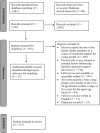A Scoping Review of the Factors That Influence Families' Ability or Capacity to Provide Young People With Emotional Support Over the Transition to Adulthood
- PMID: 34721198
- PMCID: PMC8555465
- DOI: 10.3389/fpsyg.2021.732899
A Scoping Review of the Factors That Influence Families' Ability or Capacity to Provide Young People With Emotional Support Over the Transition to Adulthood
Abstract
The transition to adulthood is typically marked by changes in relationships with family members, peers, and romantic partners. Despite this, the family often maintains a prominent role in young adults' lives. A scoping review was conducted to identify the factors that influence families' ability or capacity to provide young people with emotional support during the transition to adulthood, and to understand the gaps in this research area. Title and abstract searches were conducted from January 2007 to February 2021 in multiple databases, including PsycINFO, MEDLINE, and Sociological Abstracts. Fifteen semi-structured interviews were also conducted with stakeholders (professionals from relevant sectors/working within this field). In total, 277 articles were eligible for inclusion in the review. Following data extraction, 19 factors were identified. Factors with the most research (more than 20 articles) included: family proximity or co-residence; mental health; sex or gender differences; and family communication. Factors with less research included: societal context; young person's sexual orientation or gender identity; social networks; and adverse life events. Gaps in the research area were also identified, including methodological issues (e.g., lack of mixed methods and longitudinal study designs), a disproportionate focus on the parent-child relationship, and a lack of contextually situated research. Our findings indicate that future research in this area could benefit from taking an intersectional, multi-method approach, with a focus on the whole family and diverse samples.
Keywords: emerging adult; emotional support; family; scoping review; social support; transition to adulthood; young adult.
Copyright © 2021 Stapley, Vainieri, Li, Merrick, Jeffery, Foreman, Casey, Ullman and Cortina.
Conflict of interest statement
RU is a partner in Riches & Ullman LLP. The remaining authors declare that the research was conducted in the absence of any commercial or financial relationships that could be construed as a potential conflict of interest.
Figures
References
-
- Agueda P., Oliva A., del Carmen R. M. (2015). Family relationships from adolescence to emerging adulthood. J. Fam. Issues 36 2002–2020. 10.1177/0192513X13507570 - DOI
-
- Alhussain K., Shah D., Thornton J. D., Kelly K. M. (2019). Familial opioid misuse and family cohesion: impact on family communication and well-being. Addict. Disord. Their Treat. 18 194–204. 10.1097/ADT.0000000000000165 - DOI
-
- Allbaugh L. J. (2018). Female Adolescent Trauma Survivors and Their Parents: Change in Quality of Bond as a Predictor of Later Vulnerability or Resilience. Electronic Thesis. Oxford, OH: Miami University.
Publication types
LinkOut - more resources
Full Text Sources


